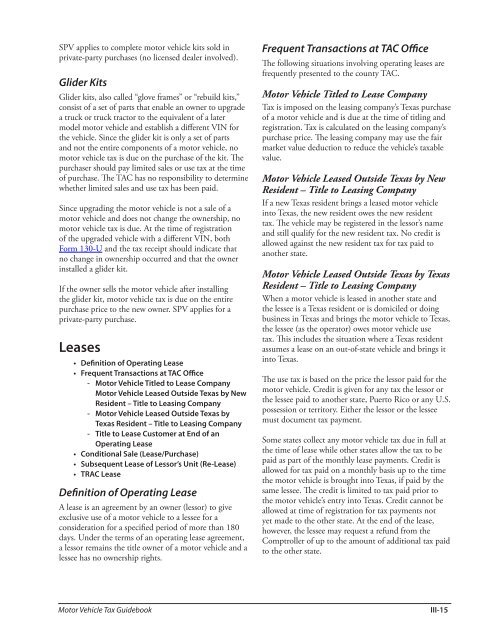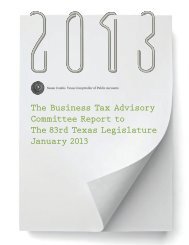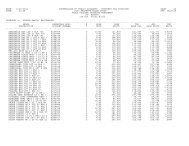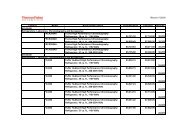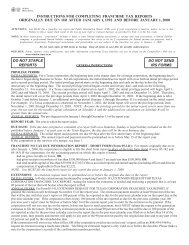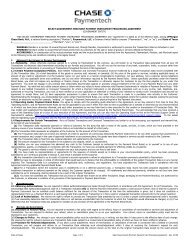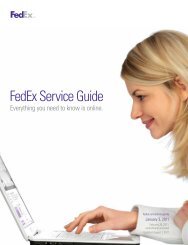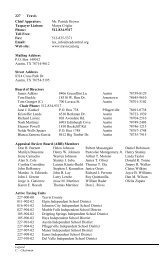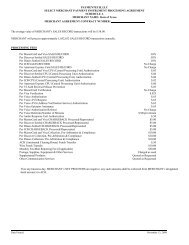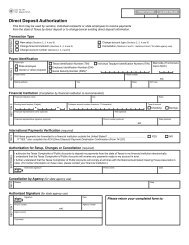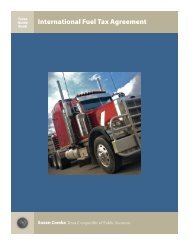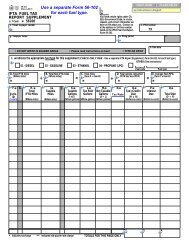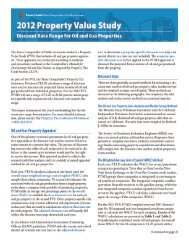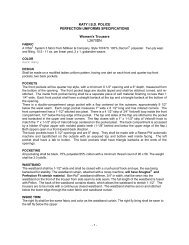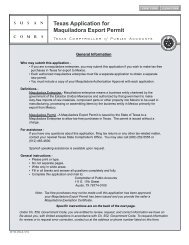Motor Vehicle Tax Guidebook 2011 - Texas Comptroller of Public ...
Motor Vehicle Tax Guidebook 2011 - Texas Comptroller of Public ...
Motor Vehicle Tax Guidebook 2011 - Texas Comptroller of Public ...
Create successful ePaper yourself
Turn your PDF publications into a flip-book with our unique Google optimized e-Paper software.
SPV applies to complete motor vehicle kits sold in<br />
private-party purchases (no licensed dealer involved).<br />
Glider Kits<br />
Glider kits, also called “glove frames” or “rebuild kits,”<br />
consist <strong>of</strong> a set <strong>of</strong> parts that enable an owner to upgrade<br />
a truck or truck tractor to the equivalent <strong>of</strong> a later<br />
model motor vehicle and establish a different VIN for<br />
the vehicle. Since the glider kit is only a set <strong>of</strong> parts<br />
and not the entire components <strong>of</strong> a motor vehicle, no<br />
motor vehicle tax is due on the purchase <strong>of</strong> the kit. The<br />
purchaser should pay limited sales or use tax at the time<br />
<strong>of</strong> purchase. The TAC has no responsibility to determine<br />
whether limited sales and use tax has been paid.<br />
Since upgrading the motor vehicle is not a sale <strong>of</strong> a<br />
motor vehicle and does not change the ownership, no<br />
motor vehicle tax is due. At the time <strong>of</strong> registration<br />
<strong>of</strong> the upgraded vehicle with a different VIN, both<br />
Form 130-U and the tax receipt should indicate that<br />
no change in ownership occurred and that the owner<br />
installed a glider kit.<br />
If the owner sells the motor vehicle after installing<br />
the glider kit, motor vehicle tax is due on the entire<br />
purchase price to the new owner. SPV applies for a<br />
private-party purchase.<br />
Leases<br />
• Definition <strong>of</strong> Operating Lease<br />
• Frequent Transactions at TAC Office<br />
- <strong>Motor</strong> <strong>Vehicle</strong> Titled to Lease Company<br />
<strong>Motor</strong> <strong>Vehicle</strong> Leased Outside <strong>Texas</strong> by New<br />
Resident – Title to Leasing Company<br />
- <strong>Motor</strong> <strong>Vehicle</strong> Leased Outside <strong>Texas</strong> by<br />
<strong>Texas</strong> Resident – Title to Leasing Company<br />
- Title to Lease Customer at End <strong>of</strong> an<br />
Operating Lease<br />
• Conditional Sale (Lease/Purchase)<br />
• Subsequent Lease <strong>of</strong> Lessor’s Unit (Re-Lease)<br />
• TRAC Lease<br />
Definition <strong>of</strong> Operating Lease<br />
A lease is an agreement by an owner (lessor) to give<br />
exclusive use <strong>of</strong> a motor vehicle to a lessee for a<br />
consideration for a specified period <strong>of</strong> more than 180<br />
days. Under the terms <strong>of</strong> an operating lease agreement,<br />
a lessor remains the title owner <strong>of</strong> a motor vehicle and a<br />
lessee has no ownership rights.<br />
Frequent Transactions at TAC Office<br />
The following situations involving operating leases are<br />
frequently presented to the county TAC.<br />
<strong>Motor</strong> <strong>Vehicle</strong> Titled to Lease Company<br />
<strong>Tax</strong> is imposed on the leasing company’s <strong>Texas</strong> purchase<br />
<strong>of</strong> a motor vehicle and is due at the time <strong>of</strong> titling and<br />
registration. <strong>Tax</strong> is calculated on the leasing company’s<br />
purchase price. The leasing company may use the fair<br />
market value deduction to reduce the vehicle’s taxable<br />
value.<br />
<strong>Motor</strong> <strong>Vehicle</strong> Leased Outside <strong>Texas</strong> by New<br />
Resident – Title to Leasing Company<br />
If a new <strong>Texas</strong> resident brings a leased motor vehicle<br />
into <strong>Texas</strong>, the new resident owes the new resident<br />
tax. The vehicle may be registered in the lessor’s name<br />
and still qualify for the new resident tax. No credit is<br />
allowed against the new resident tax for tax paid to<br />
another state.<br />
<strong>Motor</strong> <strong>Vehicle</strong> Leased Outside <strong>Texas</strong> by <strong>Texas</strong><br />
Resident – Title to Leasing Company<br />
When a motor vehicle is leased in another state and<br />
the lessee is a <strong>Texas</strong> resident or is domiciled or doing<br />
business in <strong>Texas</strong> and brings the motor vehicle to <strong>Texas</strong>,<br />
the lessee (as the operator) owes motor vehicle use<br />
tax. This includes the situation where a <strong>Texas</strong> resident<br />
assumes a lease on an out-<strong>of</strong>-state vehicle and brings it<br />
into <strong>Texas</strong>.<br />
The use tax is based on the price the lessor paid for the<br />
motor vehicle. Credit is given for any tax the lessor or<br />
the lessee paid to another state, Puerto Rico or any U.S.<br />
possession or territory. Either the lessor or the lessee<br />
must document tax payment.<br />
Some states collect any motor vehicle tax due in full at<br />
the time <strong>of</strong> lease while other states allow the tax to be<br />
paid as part <strong>of</strong> the monthly lease payments. Credit is<br />
allowed for tax paid on a monthly basis up to the time<br />
the motor vehicle is brought into <strong>Texas</strong>, if paid by the<br />
same lessee. The credit is limited to tax paid prior to<br />
the motor vehicle’s entry into <strong>Texas</strong>. Credit cannot be<br />
allowed at time <strong>of</strong> registration for tax payments not<br />
yet made to the other state. At the end <strong>of</strong> the lease,<br />
however, the lessee may request a refund from the<br />
<strong>Comptroller</strong> <strong>of</strong> up to the amount <strong>of</strong> additional tax paid<br />
to the other state.<br />
<strong>Motor</strong> <strong>Vehicle</strong> <strong>Tax</strong> <strong>Guidebook</strong><br />
III-15


